
Exclusive Interview with Jarno Trulli
Atlas F1 Assistant Editor
It's another day at the office for Renault driver Jarno Trulli. Two months after the 2003 season ended, and the Italian is hard at work, running marketing engagements for the French marque inbetween fitness camps and winter testing. Atlas F1's Michele Lostia spent a day with Trulli at the Bologna Motor Show two weeks ago and talked to him about the past season, bad luck, successful teammates and what the future holds
While this year's rules for qualifying were devised in an effort to shake up the grid, it is somewhat ironic that on that day in Suzuka, the driver to suffer most was one who's never started a Grand Prix from pole position.
Jarno Trulli is one of those drivers who are easily associated with bad luck. For one reason or another, things never seem to go quite his way. Like in the 1997 Austrian GP, where in only his 13th race - driving the Prost in lieu of injured Olivier Panis - he took the lead when Mika Hakkinen retired at the end of the first lap, held on to it until the pitstops, and later retired with engine failure from second place, abandoning that day's dreams of a first victory.
Or in this year's Malaysian GP when, after keeping his second position at the start, his car was hit from behind by Michael Schumacher's Ferrari at the second corner, dropping him to the back of the field. Even re-fuelling problems contributed in slowing him down that day, as he was charging back to the front, allowing him to finish no higher than fifth.
Besides these two Grands Prix, there are countless more failures, accidents, and circumstances he was involved in through no fault of his own. Yet Trulli remains calm, while trying to analyze his relationship with Lady Luck in a different light: "I feel essentially very lucky, because I'm in Formula One. To get here, I had to make lots of sacrifices and be in the right place at the right time."
"But if I think whether I have a credit or a debt with luck," Trulli concludes, "then I think I have a big credit."
A Cog in Renault's PR Machine
But the Renault drivers are very much a part of the automaker's marketing strategy and during the annual motor show in Bologna - just 200 miles north of Trulli's hometown Pescara - you can be sure to find the Italian there, at the Renault stand.
"It's a yearly appointment that can't be missed because it's one of the most important exhibitions for the presentation of new cars and bikes," Trulli explained two weeks ago, when he attended the Bologna Motor Show for one day, standing next to his F1 car in the Renault area while signing autographs and allowing fans to be photographed next to him.
"Doing PR work is certainly not the essential job of a driver, but it has unfortunately become a necessity for us," he continues. "Our main objective is racing of course, but in Renault we are at one with public relations and with racing, so the image that the driver projects to the public must be the image of his team and his car manufacturer."
Nevertheless, Trulli seems to enjoy the task. "This is one of those few times when you can get close to the fans," he explains. "They can ask us questions directly, get close, shake our hands, and this is something that they usually can't do when we are at the races, which is unfortunate both for them and for us."
Compared to the other automakers involved in Formula One, Renault make marketing use of their drivers to far greater extent than, say, Toyota or Honda. It means more work for Trulli and his teammate Fernando Alonso, but Trulli says he understands the necessity. "Renault aren't in F1 only to race, but especially to get their image and their products across the world. It's a majorly important and irreplaceable showcase. The results are there to prove that they have both the technology and the capabilities and that's the corporate image they want to display around the world."
At Bologna two weeks ago, after lunch, the Italian driver ran a demonstration of the Renault Clio V6 on the Motor Show's makeshift track, later describing the road car as "interesting, as I'd never driven it before. It's a good, enjoyable, agile, and powerful car, and it's also easy to drive." By the early afternoon, his day's work was done.
"The day wasn't as full as in other years," he commented before leaving, concluding that "the most enjoyable thing was meeting all the young fans, where you get asked so many new and diverse questions."
That Elusive First
Jarno Trulli made his Formula One debut in 1997 with Minardi, and after seven years in the sport he is still searching for his first pole position and victory, having started four times from the first row of the grid and having been in the lead in four Grands Prix. His teammate Alonso, seven years his junior and with only two years of experience racing in Formula One, has already grabbed two poles, four podiums (twice as many as Trulli), and the all important first victory.
Trulli admits this bothers him. "Not so much because I feel that I want to win, but because I would have deserved it more than once," he explains. "And more than once I was close to getting a pole. Even the pole that Fernando got in Malaysia [this year] was a present from me to him because I had a lot more fuel on board. We had a strategy that could have put me in a good position in the race but then I was let down by Schumacher breaking my dreams."
His best result of the season came in Hockenheim, where he finished third in the German Grand Prix. But even that race left Trulli somewhat disappointed. "The podium finish was hard fought, as it came after battling first against the flu and then against bad luck. It still leaves me a bit bitter anyway, because without some problems with the car I could have gotten something more, but I'm happy anyway."
ML: How would you summarize the last season for you?
The heartbreak of the season was the Japanese Grand Prix, where his hopes of victory were effectively shattered on Saturday, when the late rain relegated him to last on the grid. "Suzuka was really the apex [of bad luck]. And on the last race," Trulli says. "I knew I could go well there because it's a technical circuit, so I knew I could make the difference. On Friday I grabbed an incredible pole, and I was sure I could do the same on Saturday, as the results on the track were there. Unfortunately, I was denied the chance of qualifying properly and therefore to keep my pole, but most of all I lost the chance of fighting for victory.
"Even though I started last, I had a fantastic race and finished 5th, setting some blistering lap times even if I spent 80 or 90% of the race behind slower cars. But Suzuka was when I really understood that it wasn't my year, it wasn't my moment, and that's it. When you beat your adversaries for pole and then suddenly you get rain it clips your wings, and all you are left to do is to postpone better luck to next year."
ML: Let's just suppose you actually won that race. What would the off-season be like now? How would next year be different?
Trulli: "It wouldn't have changed so much. It would have been a way to get more satisfaction and confidence, but that's something I don't lack because even though I didn't get the final result, the performance was there, and this gives me great confidence and determination for next year. We should become then a top team, and therefore fight regularly for the wins against the big ones like Ferrari, McLaren and Williams. In fact, we are not far from reaching Ferrari's level: we are very close."
ML: What is stopping the team from reaching the top?
Trulli: "Well, it's a general thing. The team must grow up; we are young, as we've been in this great world of Formula One for only three years. Renault was in [this sport], then left, and now it's back in again. To re-organize the ideas against giants like Ferrari, Williams and McLaren, who have always been around, is not easy. Time was lost and the experience is different, but we can and must improve with the managing of the team in general, and that includes improving the car's performance, engine, chassis, aerodynamics and everything. Even the drivers must improve."
ML: It's been claimed Renault's primary weakness has been the engine; with the new one-engine-per-weekend rule introduced next year, could this take Renault a step back?
Trulli: "I'm not worried, because we already have more reliability now than we had at this stage [last year] with the 2003 engine. Our engine can already run 800 kms which is what will be needed for a race weekend. On top of that it's more powerful."
ML: At the same time, the team must have benefitted this year from the Michelin tyres. How much of the Renault performance this season was down to using Michelin, would you say?
Trulli: "Well, Michelin and Renault have worked step by step together, to create this great union that has produced such exceptional results. It's clear that Michelin did some tremendous work last winter. They are now preparing to be competitive again at the highest levels and to be the top players in 2004."
Teammates: Friends or Foes?
Since debuting in Formula One in 1997, Trulli had many different teammates: Ukyo Katayama, Olivier Panis, Heinz Harald Frentzen, Jean Alesi, Jenson Button, and now Alonso. These represent many different characters and levels of experience, yet the Italian seems to get on well with anyone who shares the garage with him.
In fact, his exemplary relationship with current teammate Alonso has often been mentioned and praised by everyone in the team. Still, when the media goes into hype overdrive over your teammate - as was the case this year with 22-year-old Alonso - you would be excused for being utterly fed up with it. But Trulli doesn't seem bothered at all. "He's a good driver," he says of the Spaniard. "The media is behind him because he's young and especially because he's Spanish. Spain never really had F1 drivers, so they are pushing hard for him. It's normal that the fans have this great respect and love towards him."
In his seven years in the sport, Trulli drove for a total of four teams, making his way from the bottom of the grid. Before joining Renault, he drove for Jordan Grand Prix and the difference between the Silverstone-based team and his current team, he says, is vast. "Personally I see a huge difference," he says. "Here we have people in a team with great potential, plenty of will to work. True professionals with some precise objectives. The past season was the confirmation that Renault are a great team."
Nevertheless, for most drivers, especially the ones from Italy, the final goal is to drive for Ferrari. It's not only because Ferrari are the most successful team at the moment: even during their darkest times, they were still attractive for sentimental and historic reasons. Trulli doesn't seem to be so influenced by the Ferrari fever, however.
"I find it stupid to set a final, absolute objective for myself to drive for Ferrari," he says. "I think a racing driver has to drive to win. To drive for Ferrari is, today, a dream for any driver, because Ferrari is the only team with a soul, a history, which makes us Italians proud. The entire world must recognize how great and special Ferrari is.
"But for a racing driver, once he's inside the car, he doesn't think whether the car is red, white or green, if it's a Ferrari, a Williams, or a McLaren, as long as he concentrates and believes in what he does and in the team he works with." Yet Trulli concedes eventually that "Ferrari today aren't just a name, but are also one of the best teams in F1, so to go there is a double dream. For anyone."
ML: If Ferrari offered you a job and Michael Schumacher was still there, what would you do?
Trulli's contract has been managed, for many years, by none other than his team manager, Flavio Briatore. It was Briatore who brought the driver to Renault, preferring him to Fisichella, another driver who had his contract tied to the Italian manager for a long time. Briatore and Renault also hold long-term contracts with both Alonso and Jaguar driver Mark Webber, and paddock speculations are already lining up the Australian in place of Trulli in 2005.
"We'll have to wait and see," Trulli says of his future. "For the first time, at the end of 2004, I'll have the chance to be released from a team contract and a manager contract. I'll be able to freely make my own choices, while in the past I always had clauses that forced me to take certain decisions. So at the end of the year I'll be able to make my own requests. If the team carries on growing like this I'll be happy to stay here and to carry on working.
"But at the moment it's too early to say; let's see how next season develops first."
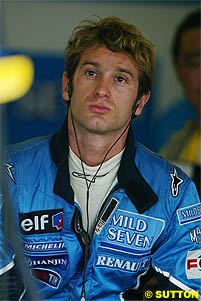 Suzuka, Saturday qualifying for the Japanese Grand Prix. As the last group of drivers get ready to make their final assault for pole position, the first spots of rain start falling on the track. By the time the last couple of drivers come out of their pits, the track is almost flooded. The drivers are forced to abandon their lap, effectively punished for being too fast on Friday.
Suzuka, Saturday qualifying for the Japanese Grand Prix. As the last group of drivers get ready to make their final assault for pole position, the first spots of rain start falling on the track. By the time the last couple of drivers come out of their pits, the track is almost flooded. The drivers are forced to abandon their lap, effectively punished for being too fast on Friday.
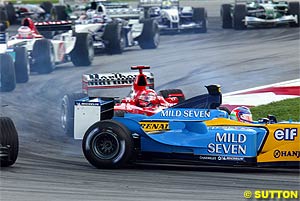 Two months since the 2003 season ended, and Jarno Trulli is hard at work. The 29-year-old Italian holds a busy winter schedule, including off-season testing, fitness camps in England and Africa, and marketing engagements for Renault and their sponsors. In many ways, the off-season holds far more work for Trulli than the Formula One season itself, especially when you consider that last year Renault virtually did not go testing between races.
Two months since the 2003 season ended, and Jarno Trulli is hard at work. The 29-year-old Italian holds a busy winter schedule, including off-season testing, fitness camps in England and Africa, and marketing engagements for Renault and their sponsors. In many ways, the off-season holds far more work for Trulli than the Formula One season itself, especially when you consider that last year Renault virtually did not go testing between races.
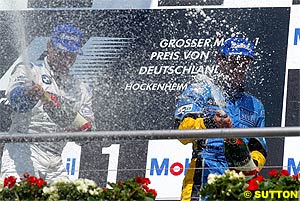 Trulli: "I'd say it was rather good, even though I could have reaped a bit more if I wasn't a bit too unlucky. But besides that I'd say it went pretty well. I've often been on pole on Friday, and even if for various reasons I didn't manage to be fastest on Saturday, I feel satisfied for myself and extremely happy about the development of the team throughout the year."
Trulli: "I'd say it was rather good, even though I could have reaped a bit more if I wasn't a bit too unlucky. But besides that I'd say it went pretty well. I've often been on pole on Friday, and even if for various reasons I didn't manage to be fastest on Saturday, I feel satisfied for myself and extremely happy about the development of the team throughout the year."
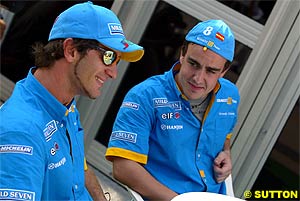 "I'm a person that gets on well with anyone," he smiles. "I can adapt to circumstances and to people. I think I'm a great teammate, as I'm fast, I know how to work with the team and with the teammate, and most of all I try to build good working relationships in the environment I'm in, which is something extremely important in a Formula One team, as there are so many people working towards the same objective."
"I'm a person that gets on well with anyone," he smiles. "I can adapt to circumstances and to people. I think I'm a great teammate, as I'm fast, I know how to work with the team and with the teammate, and most of all I try to build good working relationships in the environment I'm in, which is something extremely important in a Formula One team, as there are so many people working towards the same objective."
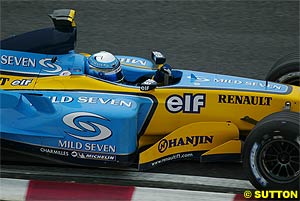 Trulli: "I don't know. I cannot reply, as it's a question I've never asked myself."
Trulli: "I don't know. I cannot reply, as it's a question I've never asked myself."
Please Contact Us for permission to republish this or any other material from Atlas F1.
